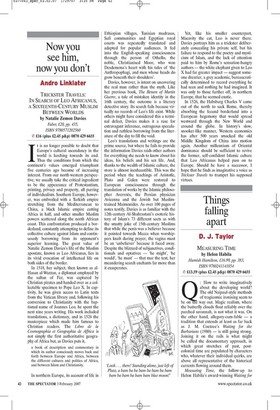Now you see him, now you don't
Andro Linklater TRICKSTER TRAVELS: IN SEARCH OF LEO AFRICANUS, A SIXTEENTH-CENTURY MUSLIM BETWEEN WORLDS by Natalie Zemon Davies Faber, £20, pp. 435, ISBN 9780571202560 © £16 (plus £2.45 p&p) 0870 429 6655 1 t is no longer possible to doubt that Europe's cultural ascendancy in the world is lurching towards its end. Thus the conditions from which the continent's values emerged triumphant five centuries ago become of increasing interest. From our north-western perspective, we usually take the critical ingredient to be the appearance of Protestantism, printing, privacy and property, all purring of individualism. Southern Europe, however, was embroiled with a Turkish empire stretching from the Mediterranean to China, a black Islamic empire cutting Africa in half, and other smaller Muslim powers scattered along the north African coast. This confrontation produced a borderland, constantly attempting to define its collective culture against Islam and continuously borrowing from its opponent's superior learning. The great value of Natalie Zemon Davies's life of the Muslim apostate, known as Leo Africanus, lies in its vivid evocation of intellectual life on both sides of the border.
In 1518, her subject, then known as alHasan al-Wazzan, a diplomat employed by the sultan of Fez, was captured by Christian pirates and handed over as a collectable specimen to Pope Leo X. In captivity, he was given access to Latin texts from the Vatican library and, following his conversion to Christianity with the baptismal name of Joannes Leo, he spent the next nine years writing. His work included translations, a dictionary, and in 1526 the masterpiece which made him famous to Christian readers. The Libro de la Cosmographia et Geographia de Affi-ica is not simply the first authoritative geography of Africa but, as Davies puts it, a book of description and commentary in which its author consciously moves back and forth between Europe and Africa, between the different cultures and polities of Africa, and between Islam and Christianity.
Ethiopian villages, Tunisian madrasas, Sufi communities and Egyptian royal courts was repeatedly translated and adapted for popular audiences. It fed into the English-speaking consciousness through the person of Othello, the noble, Christianised Moor, who won Desdemona's heart with his tales of 'the Anthropophagi, and men whose heads do grow beneath their shoulders'.
Davies, however, is intent on uncovering the real man rather than the myth. Like her previous book, The Return of Martin Guerre, a tale of mistaken identity in the 16th century, the outcome is a literary detective story. Its search fails because virtually no records of Leo's life exist. While others might have considered this a terminal defect, Davies makes it a ruse for extravagant inference, outrageous speculation and ruthless borrowing from the literature of the day to fill the void.
Leo's translations and writings are the prime source, but where he fails to provide the information Davies raids other authors for everything she needs to know about his ideas, his beliefs and his sex life. And, thanks to the wealth of Islamic culture, the store is almost inexhaustible. This was the period when the teachings of Aristotle, Plato and Galen were restored to European consciousness through the translation of works by the Islamic philosopher Averroes, the Persian physician Avicenna and the Jewish but Muslimtrained Maimonides. As over 100 pages of notes testify, Davies is as familiar with the 12th-century Al-Shahrastani's esoteric history of Islam's 73 different sects as with the smutty joke of 15th-century Muslims that while the penis was a believer because it pointed towards Mecca when worshippers knelt during prayer, the vagina must be an 'unbeliever' because it faced away. Despite the blizzard of subjunctives, conditionals and optatives — 'he might', 'he would', 'he must' — that mar the text, her meandering search enchants far more than it exasperates.
Yet, like his smaller counterpart, Macavity the cat, Leo is never there. Davies portrays him as a trickster deliberately concealing his private self, but his failure to respond to the poetry and mysticism of Islam, and the lack of attention paid to him by Rome's sensation-hungry authors — the white elephant given to Leo X had far greater impact — suggest someone drearier, a grey academic, bureaucratically determined to record everything he had seen and nothing he had imagined. It was only to those further off, in northern Europe, that he seemed exotic.
In 1526, the Habsburg Charles V came out of the north to sack Rome, thereby absorbing the fecund borderland into a European hegemony that would spread westward through the New World and around the globe. In history's slow, snooker-like manner, Western economics has after 500 years smacked the old Middle Kingdom of China into motion again. Another millennium of Oriental dominance should be sufficient to revive the former, self-confident Islamic culture that Leo Africanus helped pass on to Europe. Should he have a successor, I hope that he finds as imaginative a voice as Trickster Travels to trumpet his supposed virtues.




















































 Previous page
Previous page